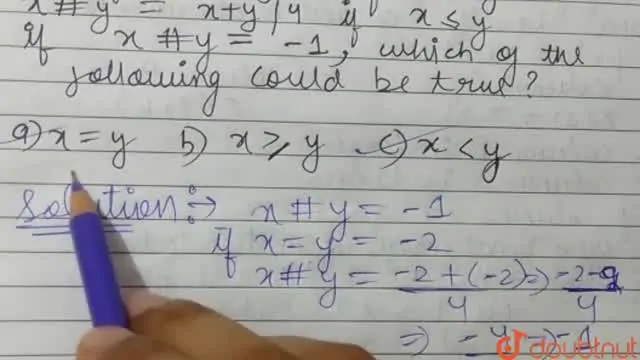Define the symbol # by the following equations:
x#y=(x−y)2, ifx>yx#y=x+y/4, ifx≤y
If x#y=−1, which of the following could be true?
The correct Answer is:A, C
Step by step video, text & image solution for Define the symbol # by the following equations: {:(x#y = (x - y)^(2),", if" x > y),(x#y = x + y//4,", if" x le y):} If x # y = -1, which of the following could be true? by Maths experts to help you in doubts & scoring excellent marks in Class 12 exams.
Similar Questions
If 2x=2y+1, then which of the following could be true?
View SolutionIF x2+2xy+y2=64 and y-x=12, which of the following could be the value of x?
View SolutionSolve the following system of equations: x+yxy=2, x−yxy=6
View SolutionSolve for x and y in the following equations :
x+4y=10
y−x=−5View SolutionIf x2−y2=16andx+y>x−y, then which one of the following could x−y equal ?
View SolutionFor all nonzero numbers x and y, the operation ∇ is defined by the equation x∇y=|x|x2+y2|y| when x>y and by the equation x∇y=|x|y2−x2|y| when x≤y. If x∇y<0, then which of the following could be true ?
I. x3=y3
II. (y+x)(y−x)>0
III. x−y>0View SolutionSolve the following system of equations: 3x+y+2x−y=2, 9x+y−4x−y=1
View SolutionSolve the following differential equation: (y2−2xy)dx=(x2−2xy)dy
View SolutionSolve the following system of equations: x+y=2xy, x−yxy=6, x≠0, y≠0
View SolutionSolve the following differential equations: yex/ydx=(xexy+y)dy
View Solution


